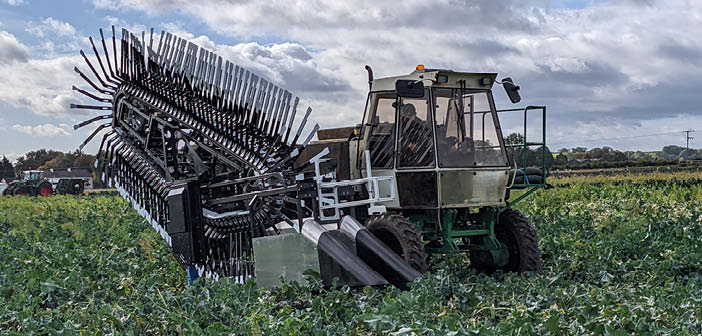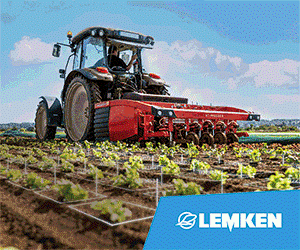Elbow Beach Capital, the decarbonisation, sustainability and social impact investor, announces a £500k investment into Shropshire-based broccoli protein specialist, upp to support the commercialisation of the company’s unique harvest automation and upcycling technologies.
Growing to waste
The United Kingdom is one of the largest producers of broccoli in the world but is reliant on increasingly scarce and expensive labour to harvest broccoli heads by hand, leaving the remaining 80% of the food grade biomass (stem, stalk and roots) unused.
upp’s breakthrough harvesting equipment uses 3D cameras and machine learning to identify broccoli heads that are ready for harvesting even if they are partially obscured by leaves; a patented tractor-towed tool then cuts and lifts the whole plant onto a trailer where the heads are separated from the leaf and stalk. To the benefit of farmers, upp’s breakthrough harvest automation replaces seven seasonal agricultural workers, and can work at night, preventing wastage and increasing yields.
uppcyclingTM
After the broccoli heads have been harvested and delivered to market, upp focuses on the 80% of the broccoli plant that would otherwise go to waste. This 80% is left for uppcyclingTM into clean, natural, healthy proteins and ingredients.
Boston Consulting Group recently estimated that the food system currently accounts for 26% of global CO2 emissions and concluded that switching to alternative, plant-based proteins is one of the most impactful ways to combat the climate crisis.
If, by 2035, 11% of all protein consumed globally were substituted for plant-based alternatives, BCG analysis concludes that more than 1 gigaton of CO2e would be saved, the equivalent to decarbonising 95% of the aviation industry.
However, plant-based proteins are not without environmental impact. The two most popular protein alternatives are either carbon intensive (pea) or a contributor to deforestation and farmer displacement (soya). upp’s broccoli protein is four times less carbon intensive than pea protein and avoids the ecological and social issues caused by over-reliance on soya farming.
Unlocking the potential of previously unused plant protein
The funding from this round will be used to pilot both upp’s harvest and uppcyclingTM technology this year, with the company aiming to complete three field-to-protein pilots in the UK, Spain and California by the end of 2024. First commercial production of upp’s broccoli protein is expected to commence in late 2024.
The global plant protein market is currently worth over £30bn and is expected to surpass £130 billion by 2030. upp estimates that once its potential is unlocked, the broccoli-based protein market alone could be worth over £35bn by 2030. upp aims to be generating first revenues in 2024, growing to more than £50 million in revenue in its three pilot markets in 2027.
David Whitewood, CEO of upp commented: “upp is all about making the most of the crops that we already grow. Upcycled broccoli is much more than a more environmentally friendly alternative to pea- protein, it is packed with health-promoting nutrients, fibre and is entirely natural.”
In a future market of bioreactor and lab grown alt-proteins, plant-based foods with good provenance, will attract a premium like organic grass-fed beef does today”
Jon Pollock, CEO of Elbow Beach Capital, added: “Food wastage, carbon-intensive protein production and labour shortages are three of the most significant issues in UK and international agriculture. upp is working to address all three. David and his team have achieved a great deal in a short period of time, and we’re excited to see the results of their pilots this year.”
Andy Summerfield has joined upp’s board of directors as a representative of Elbow Beach Capital with immediate effect.














